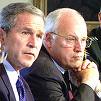Investigate Bush Abuses: A Real Investigation or a Waste of Time?
Rep. Wexler Announces Legislation for Select Committee

In a letter to voters, Congressman Robert Wexler (D-FL) has announced his introduction of House Resolution 383 to establish “a bi-partisan Select Committee tasked with making comprehensive recommendations on our national security policy – including those covering laws on torture, FISA law violations, wiretapping, civil liberties protections, among others. This committee would have all of the power of a standing committee, including subpoena power.” Co-sponsors are Barbara Lee (D-CA) and John Conyers (D-MI). Conyers is chairman of the House Judiciary Committee.
Wexler’s statement continued by stating that, “The committee will investigate many of the outrageous policies of the Bush Administration to unearth and expose what happened during the past eight years…. We must take a hard look at what went wrong in the last eight years. We must continue to peel back the veil of secrecy that the previous Administration used as cover to undermine our system of checks and balances, and establish a clear line between what is necessary for our security and what is unlawful government intrusion and a violation of our civil liberties.”
Wexler is not the only member of Congress to announce his attention to call out the Bush administration on its abuses. Senator Patrick Leahy wants to set up a “Truth Commission,” whose mission, as described in Time, would be “to investigate the politicization of prosecution in the Justice Department under former Attorney General Alberto Gonzales; the wiretapping of U.S. Citizens; the flawed intelligence used to justify the invasion of Iraq; and the use of torture at Guantanamo and so-called black sites abroad. Leahy’s commission is to be modeled after one that investigated the apartheid regime in South Africa .”
The trouble is that congressional investigating committees rarely amount to anything. An example was the 1976 House Select Committee on Assassinations, set up to investigate the killings of President John F. Kennedy and Dr. Martin Luther King, Jr. The committee met largely in secret, withheld much of its evidence from the public, and, while it said both assassinations likely involved conspiracies, stated no government agencies were parties to them. The latter point has been disputed by independent researchers both before and since.
Another example was the National Commission on Terrorist Attacks on the United States , a.k.a, the 9/11 Commission. While the commission concluded that failures of the CIA and FBI allowed the attacks to occur, it failed to look at any possibility of complicity by those agencies or the Bush administration. Members of the commission later said government officials lied to them and impeded the investigation.
It’s possible, of course, that any committees set up to investigate Bush, Cheney, at.al., will have better luck, but will they examine the questions that really matter? Neither Wexler nor Leahy mention reopening the 9/11 case. And neither mentions the event that may be just as momentous—this is the “financial 9/11”; i.e., the 2008 collapse of the U.S. financial system.
I’d like to find out, for instance, how the 9/11 terrorist attacks were connected with the extraordinary movement of massive amounts of funds within and outside the Federal Reserve and U.S. banking system that led to a huge growth in the M3 monetary supply before the Federal Reserve stopped reporting M3 data in 2006. Such a link has been suggested in some internet reports.
I’d also like to know how and why Federal Reserve Chairman Alan Greenspan colluded with the Bush White House to suddenly start pumping massive amounts of credit into the housing bubble from 2001-2005 and what instructions went out to Comptroller of the Currency, the Securities and Exchange Commission, and other federal regulators to prevent the abuses in the subprime mortgage market from being investigated.
Then I’d like to know why the Bush Administration, including Secretary of the Treasury Henry Paulson, claimed no one foresaw the crash of the financial system in October 2008, why the demand was suddenly made to Congress for over $700 billion in bank bailouts, and what the role of Paulson and the host of other former Goldman-Sachs executives working for the Bush administration had in setting the stage for the crash and profiting from it. And why is current Secretary of the Treasury Timothy Geithner doing virtually the same as Paulson did in throwing money at the banks while the economy sinks deeper in recession?
Of course neither Wexler nor Leahy intends to examine any of these issues. Which is why their calls for investigations make good political theater, may put a few minor players on the hot seat, but, in the big picture, will be a complete waste of time. A better course would be a Special Prosecutor. But the Obama administration has given no indication of doing this either.
Richard C. Cook is a former federal analyst who writes on public policy issues. His book “We Hold These Truths: the Hope of Monetary Reform” is now available at www.tendrilpress.com. His website is www.richardccook.com.

